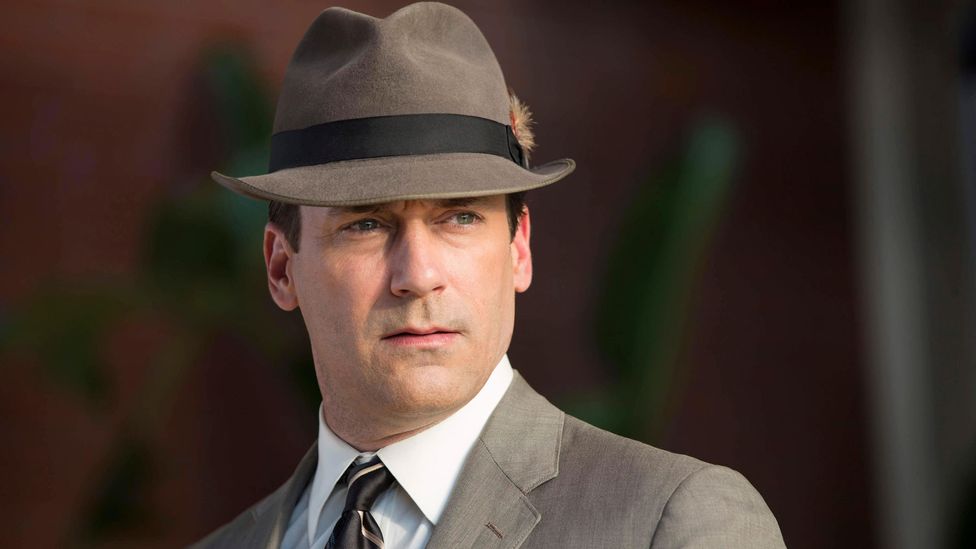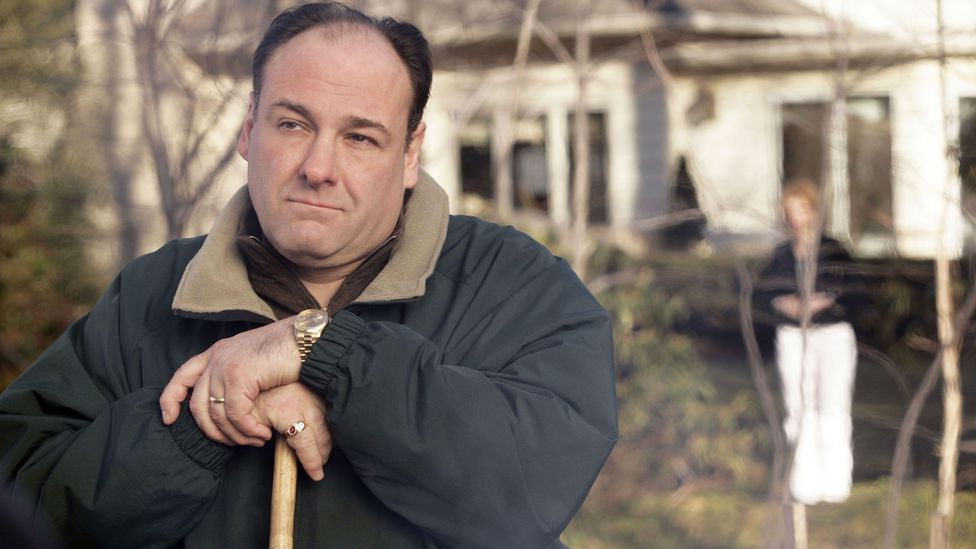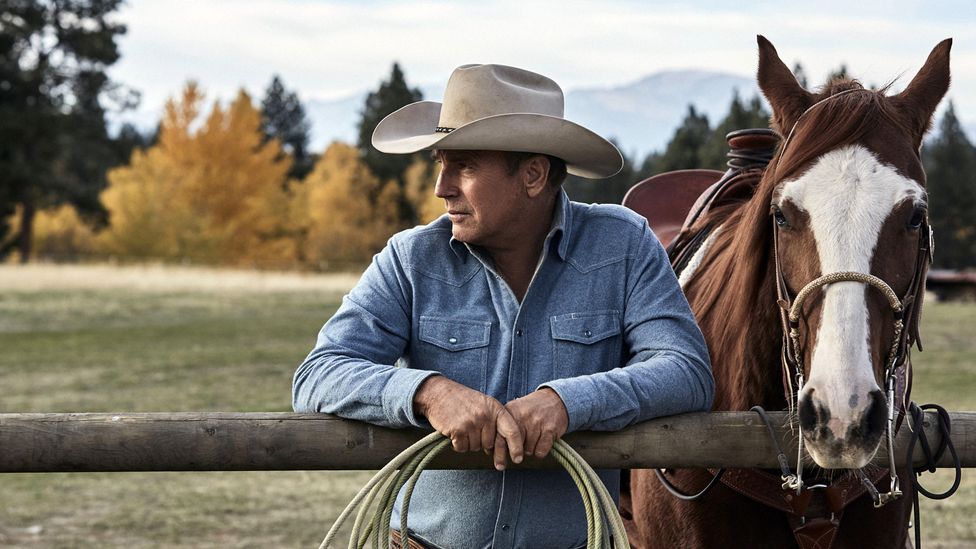In BBC Culture's recent poll of the 100 greatest series of the 21st Century, there's an empty seat at the table reserved for one Tony Soprano. The ground rule that shows premiering prior to the millennium would be ineligible for inclusion precluded HBO's landmark mob drama from making the cut, but its absence is every bit as perceptible as its presence would've been. The top hundred is littered with Tony's relatives and descendants, from chemistry-teacher-turned-meth-dealer Walter White (protagonist of Breaking Bad, number 3 on the list) to serial killer Dexter Morgan (of Dexter, number 89) and crooked politician Frank Underwood (from House of Cards, number 60) – malign male characters joined in a lineage of morally complex anti-heroism.
Read more about BBC Culture's 100 greatest TV series of the 21st Century:
- The 100 greatest TV series of the 20th Century
- Twenty-five TV series that define the 21st Century
- How the way we watch TV has changed
- What makes The Wire such a great number one
- Why May I Destroy You is the future of TV
Matthew Weiner, who was a writer and producer on later seasons of The Sopranos, would go on to create Mad Men (number 2 in the poll), which centred on mesmerising ad man Don Draper; like Tony, he was another chronic compartmentaliser who used sex in the same evasive, isolating way that his predecessor used violence. Terence Winter, another key architect of The Sopranos' later seasons, created Boardwalk Empire and the crooked politico Nucky Thompson, cut from this same cloth. (The odd anti-heroine also popped up here and there, like Edie Falco's miscreant Nurse Jackie and Mary-Louise Parker's suburban drug dealer on Weeds, though both of those shows somewhat lightened themselves with comedy.)

From Breaking Bad's Walter White to Mad Men's Don Draper, antiheroes dominated 'prestige TV' during the 2000s (Credit: Alamy)
The cruel white men concealing dark secrets beneath a composed façade first defined and then dominated the concept of "prestige TV", certainly in reference to US output, throughout the 2000s. Though each season would plumb fresh depths of contemptible behaviour, we couldn't stop watching, chasing that elusive glint of redemption. For the best of these antihero series, the adoring reviews helped television finally earn that most coveted seal of highbrow approval by making comparisons to literature. Like any other media trend, this one crested and eventually died down, though it hasn't vanished completely. While critics and tastemakers have largely begun to gravitate toward kinder, more hopeful fare in the vein of the can-do optimist Ted Lasso, the antihero drama as we knew it lives on outside the zeitgeist. Watched by a silent viewing majority, US network shows in hidebound genres like the police procedural and Western have sustained this narrative tradition's popularity even as its relevance wanes.
The enduring appeal of the antihero
The appeal of the antihero drama's Sopranos-era "golden age" was potent and primal. For all their flaws – brutality, narcissism, infidelity, overall stuntedness – these characters had some undeniable magnetism that kept audiences hooked. Their competence, charisma, and confidence turned these often-loathsome men into compelling, conflicted creatures, certainly helped along by some of the finest acting and writing the small screen has ever seen. Year after year, the rich tensions between the repellent and absorbing sides of their personalities made for enthralling entertainment as the forlorn promise of their betterment flashed in the distance. We rooted for Tony and his many acolytes to seize the personal change they ineffectively grasped at from one season to the next, clinging to the belief that our own self-improvement could be possible if theirs was, too. At the same time, audiences also felt an inexorable attraction to the power these men wielded as bosses, executives, or kingpins. They commanded the people around them while floundering to take control of themselves.
"The antihero drama is always going to be with us in one form or another," says Emily VanDerWerff, a TV critic at US website Vox. "It's worth asking why that continues to be the case." I think it's because deep down in American culture, we want to believe that we can fix or change or meaningfully alter the world. It's bred into us that we’re the protagonist of the story we're watching, so we identify with them. That's not malicious, it's just how the brain interprets a story. But sometimes we start to think that one person really can change everything, and we know from living in reality that that's rarely true."
If the antihero drama is still around, though, it has certainly fallen out of fashion. It's hard to put a pin on when that happened – perhaps somewhere around the early 2010s, when such streaming platforms as Netflix and Amazon Prime began to supplant US cable giants HBO and AMC as the prime breeding ground for buzzed-about TV – but the causes are much clearer. A tectonic fracture in America's cultural terrain left the white, male, hetero, cisgender, middle-aged demographic typically foregrounded by this genre out of public favour, and it wasn't long before that sentiment trickled down into the programming.

The original 'golden age' anti-hero drama The Sopranos became a favoured binge-watch during the pandemic (Credit: Alamy)
A long-overdue increase in diversity widened the scope of who could carry a series, and as the progressive-minded incoming class of TV creators centred women, people of colour, and non-heteronormative characters, they used substantially adjusted narrative dynamics. From I May Destroy You to Pose to Shrill, these shows mined drama from external obstacles forced upon often flawed but essentially sympathetic lead characters dealing with a society stacked against them, rather than the solipsistic existential quandaries experienced by the privileged. There's an optics angle to be considered as well, that a loathsome protagonist is a safer sell for a network when applied to the white men on the winning side of hegemony.
Where these characters have ended up
But if newly minted antiheroes aren't exactly fashionable anymore, audiences are still enamoured by the golden oldies: the followings for the '00s heavyweights only continue to grow, with the international lockdowns generating many reports on how and why The Sopranos has become a favoured binge-watch. All the while, antihero shows have kept getting the green light, albeit to more unabashedly populist ends. The political alignment of America's four big networks – NBC, ABC, CBS, and Fox – skews from centre-left to centre-slightly-further-right, and their relationship to corrupt, compromised men reflects an enduring affinity that the shows topping year-end lists are taking strides to unlearn. The police procedural still reigns supreme on network TV, its draw predicated in part on our at-times morbid fascination with all things seedy and lurid, a relaxed ethical stance that extends to the leading figures. While young-skewing sitcom Brooklyn Nine-Nine has reckoned with evolving attitudes toward policing, the likes of the mega-successful Law and Order franchise have stuck by their cops-on-the-edge. Christopher Meloni's Elliot Stabler, a driven detective whose pursuit of justice often leads him to rampage over the line, now leads in his own spin-off series subtitled Organized Crime, bringing the hurt to the mob.
Stabler's latest vehicle doesn't lose much sleep over his various lapses, telling of a widespread disinterest within network shows in exploring difficult personal judgements over more pleasurable gawking at sinfulness. Not so far off on the moral spectrum is The Blacklist, a ratings smash on NBC for nine seasons and counting, in which James Spader plays the sort of character who inspired the phrase "love to hate". As Red, the criminal mastermind tentatively working with the FBI to track down other public enemies, his air of arch villainy covers the occasional glimmer of humanity. But the lure of this show, along with the many others modeled after Silence of the Lambs' twisted investigations (the short-lived Prodigal Son, starring Michael Sheen as a serial killer helping out his law-enforcer offspring, put a family-affair spin on the formula), lies in the perverse weekly thrill of tagging along with the bad guys.
A factor more relevant than ever to the anti-hero drama is the so-called "bad fan" – as outlined by the New Yorker’s former TV critic Emily Nussbaum in reference to Breaking Bad back in 2014 – who views the antihero as a straightforwardly likable person, blowing right past the nuance and ambiguity to a troubling full embrace of someone we're meant to keep at arm's length. Arguably, many of today's antihero shows only give more leeway for "bad fandom" to occur because, as VanDerWerff says, they are generally less willing to examine their contradictions.
She cites the Paramount Network's western Yellowstone, starring Kevin Costner as a John Wayne-esque rancher taking whatever ethically questionable measures he must to protect his land, as an example. "[The show] understands that the people coming after [Kevin Costner's character] are not evil, they tend to be Native Americans or big-city land developers," she says. "But it wonders whether he needs to own a ranch the size of West Virginia, and lands on 'maybe no, but actually yes' … It's uncritical about its antihero. It's about 'you need to do this, to protect your family and take care of the land'." Yet this lack of consciousness has done nothing to detract from the show's monster numbers, with more than 14 million US viewers reportedly tuning into last week's season four premiere, as Paramount preps an upcoming prequel spinoff.

Western Yellowstone has proved a monster hit – though it is less penetrating than the anti-hero dramas of old (Credit: Alamy)
Whether the antihero drama can regain its artistic standing to match its ratings success has yet to be seen. After the upswell of humanist compassion defining today's TV, perhaps it's only a matter of time until the pendulum swings again. Within the realm of critically lauded, watercooler TV, the closest we've got to a typical antihero lead right now is probably ambivalent corporate raider Kendall on HBO's Succession (no 10 in the poll), though the show itself has more in common with Seinfeld's free-for-all of casual amorality. We're meant to delight in the horrible antics of its absurdly pampered ensemble, though as VanDerWerff notes, the contemplative moments allow the show to "play in the antihero sandbox".
We await the second coming of the blue-chip Tony Soprano-esque antihero, in the hopes that his, her, or their creator might have the audacity to fit that bitter-pill-of-the-soul narrative model to a different type of actor. The goal shouldn't be to relegate such deeply compromised characters and their harrowing inventories to mainstream semi-obscurity, but to widen the inclusion to these archetypes. Everyone deserves to see the worst parts of themselves splayed on screen.
Read more about BBC Culture's 100 greatest TV series of the 21st Century:
– How the way we watch TV has changed
– What makes The Wire such a great number one
– Twenty-five series that define the 21st Century
How many of these series have you seen? Let us know using the hashtag #TVOfTheCentury on our Facebook page or message us on Twitter.
Love film and TV? Join BBC Culture Film and TV Club on Facebook, a community for cinephiles all over the world.
And if you liked this story, sign up for the weekly bbc.com features newsletter, called The Essential List. A handpicked selection of stories from BBC Future, Culture, Worklife and Travel, delivered to your inbox every Friday.
"TV" - Google News
November 17, 2021 at 07:04AM
https://ift.tt/3nmrIsN
What's happened to TV's very bad men? - BBC News
"TV" - Google News
https://ift.tt/2T73uUP
Bagikan Berita Ini














0 Response to "What's happened to TV's very bad men? - BBC News"
Post a Comment